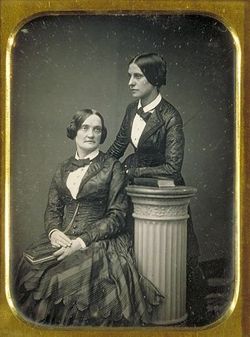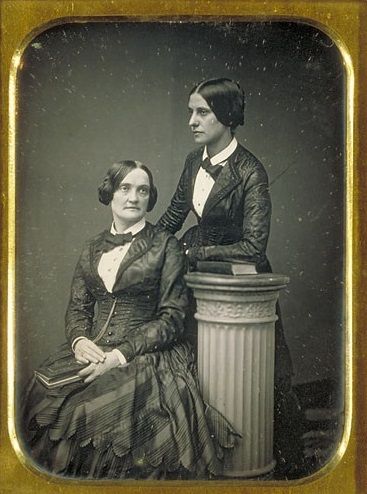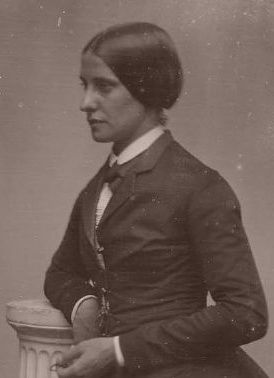Matilda Hays was born in London on 8 September 1820, the daughter of a corn merchant named John Hays. Elizabeth Mary Hays was Matilda Hay's mother. She was first married to Jacob Breese who died in February 1807, and she later married John Hays. Matilda's siblings were Elizabeth, Susanna and Albert. She had two half-sisters, Emma Marianne Breese and Clara Salmon, who married Frederick Salmon in 1830.
Hays was identified as a Creole or, according to Joseph Parkes, half Creole; if this is so, at most she can only have been half Creole through her mother; her father's origins are Londoners going back at least three generations. She wrote articles for periodicals, often regarding women's issues, starting about 1838. The periodicals included The Mirror and Ainsworth's Magazine.
She had close personal relationships with Charlotte Cushman, Adelaide Anne Procter and Harriet Hosmer.
Hays and Charlotte Cushman met between 1846 and 1848. Soon after, they began a lesbian affair, a relationship they maintained for nearly 10 years, and in Europe were publicly known as a couple. Elizabeth Barret Browning commented, "I understand that she (Cushman) and Miss Hays have made vows of celibacy and of eternal attachment to each other -- they live together, dress alike,... it is a female marriage." They wore tailored shirts and jackets. Matilda was often referred to by their friends as Mathew or Max.
In 1852 Cushman retired from the stage and joined Hays in Rome, Italy, where the lived in an American expatriate community, made up mostly of lesbian artists and sculptors. In 1854, Hays left Cushman for Harriet Hosmer, which launched a series of jealous interactions among the three women. Hays eventually returned to live with Cushman, but the tensions between her and Cushman would never be repaired. By late 1857, Cushman was secretly involved with Emma Stebbins. One night while Cushman was writing a note, Hays walked in, suspected that the note was to Stebbins, and demanded to see it. Cushman refused and Hays became mad and chased her round the house, hitting her with her fists. The relationship ended and Hays sued Cushman, claiming that she sacrificed her career to support Cushman's career. Cushman made a payment to Hays and their relationship ended.
Hays was believed to have had a love interest in Adelaide Anne Proctor, who dedicated Legends and Lyrics to her with:
Our tokens of love are for the most part barbarous, Cold and lifeless, because they do not represent our life. The only gift is a portion of thyself. Therefore let the farmer give his corn; the miner, a gem; a sailor, coral and shells; the painter, his picture; and the poet, his poem.
— Emerson
She also wrote a love poem for Hays entitled, A Retrospect. Hays oversaw the tending of Procter's grave after her death and mourned her passing throughout her later years.
Hays was a companion to Lady Monson in her later years and died in Liverpool at 15 Sefton Drive in Toxteth Park, on 3 July 1897. Although Adelaide Procter had died 30 years before Hays, the Liverpool Echo obituary stated that she had been "the dear friend of Adelaide Procter, gone before." It did not mention her literary accomplishments.
Matilda Hays was born in London on 8 September 1820, the daughter of a corn merchant named John Hays. Elizabeth Mary Hays was Matilda Hay's mother. She was first married to Jacob Breese who died in February 1807, and she later married John Hays. Matilda's siblings were Elizabeth, Susanna and Albert. She had two half-sisters, Emma Marianne Breese and Clara Salmon, who married Frederick Salmon in 1830.
Hays was identified as a Creole or, according to Joseph Parkes, half Creole; if this is so, at most she can only have been half Creole through her mother; her father's origins are Londoners going back at least three generations. She wrote articles for periodicals, often regarding women's issues, starting about 1838. The periodicals included The Mirror and Ainsworth's Magazine.
She had close personal relationships with Charlotte Cushman, Adelaide Anne Procter and Harriet Hosmer.
Hays and Charlotte Cushman met between 1846 and 1848. Soon after, they began a lesbian affair, a relationship they maintained for nearly 10 years, and in Europe were publicly known as a couple. Elizabeth Barret Browning commented, "I understand that she (Cushman) and Miss Hays have made vows of celibacy and of eternal attachment to each other -- they live together, dress alike,... it is a female marriage." They wore tailored shirts and jackets. Matilda was often referred to by their friends as Mathew or Max.
In 1852 Cushman retired from the stage and joined Hays in Rome, Italy, where the lived in an American expatriate community, made up mostly of lesbian artists and sculptors. In 1854, Hays left Cushman for Harriet Hosmer, which launched a series of jealous interactions among the three women. Hays eventually returned to live with Cushman, but the tensions between her and Cushman would never be repaired. By late 1857, Cushman was secretly involved with Emma Stebbins. One night while Cushman was writing a note, Hays walked in, suspected that the note was to Stebbins, and demanded to see it. Cushman refused and Hays became mad and chased her round the house, hitting her with her fists. The relationship ended and Hays sued Cushman, claiming that she sacrificed her career to support Cushman's career. Cushman made a payment to Hays and their relationship ended.
Hays was believed to have had a love interest in Adelaide Anne Proctor, who dedicated Legends and Lyrics to her with:
Our tokens of love are for the most part barbarous, Cold and lifeless, because they do not represent our life. The only gift is a portion of thyself. Therefore let the farmer give his corn; the miner, a gem; a sailor, coral and shells; the painter, his picture; and the poet, his poem.
— Emerson
She also wrote a love poem for Hays entitled, A Retrospect. Hays oversaw the tending of Procter's grave after her death and mourned her passing throughout her later years.
Hays was a companion to Lady Monson in her later years and died in Liverpool at 15 Sefton Drive in Toxteth Park, on 3 July 1897. Although Adelaide Procter had died 30 years before Hays, the Liverpool Echo obituary stated that she had been "the dear friend of Adelaide Procter, gone before." It did not mention her literary accomplishments.
Family Members
Advertisement
Explore more
Sponsored by Ancestry
Advertisement







